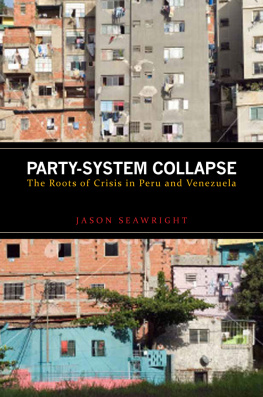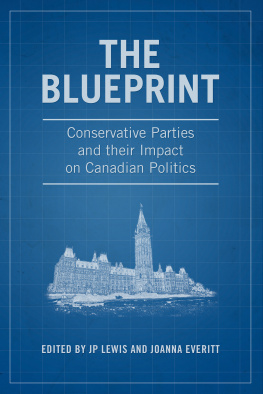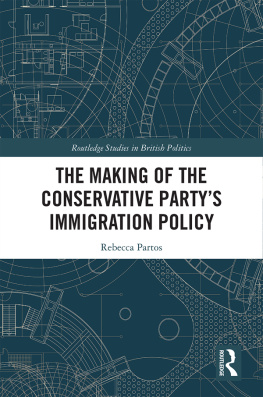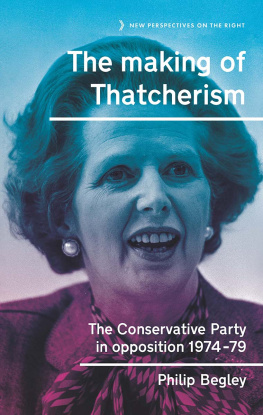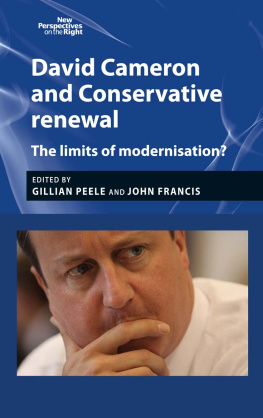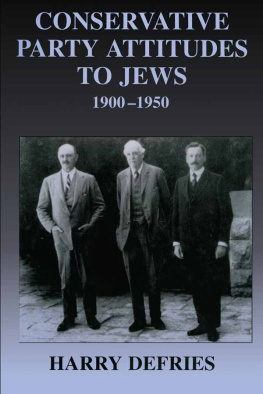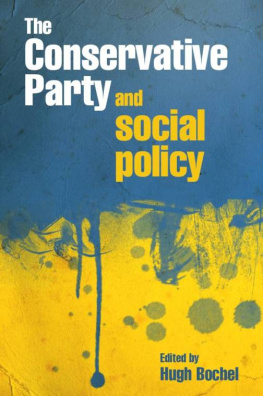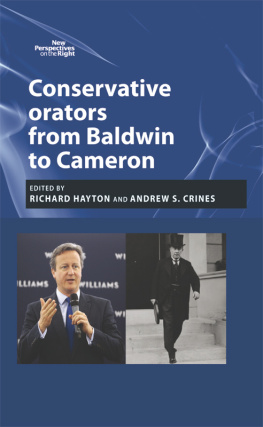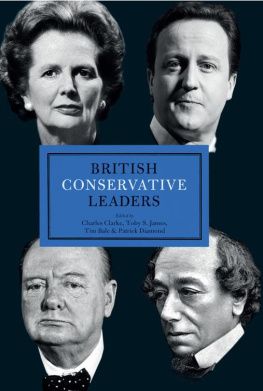The British Conservative Party and
One Nation Politics
THE BRITISH
CONSERVATIVE PARTY
AND ONE NATION
POLITICS
David Seawright

2010
The Continuum International Publishing Group Inc
80 Maiden Lane, New York, NY 10038
The Continuum International Publishing Group Ltd
The Tower Building, 11 York Road, London SE1 7NX
www.continuumbooks.com
Copyright 2010 by David Seawright
All rights reserved. No part of this book may be reproduced, stored in a retrieval system, or transmitted, in any form or by any means, electronic, mechanical, photocopying, recording, or otherwise, without the written permission of the publishers.
Library of Congress Cataloging-in-Publication Data
A catalog record for this book is available from the Library of Congress.
eISBN-13: 978-1-4411-6111-6
Typeset by Newgen Imaging Systems Pvt Ltd, Chennai, India
Printed in the United States of America
Acknowledgments
As is often the case, the work on a book such as this incurs a multitude of debts. Thus, there is the obvious obligation on my part to express my gratitude to all those who have helped and assisted, in a variety of ways, with the completion of this research monograph. With this in mind I would like to begin with an acknowledgment of the assistance of the British Academy, for the research grant SG 35058 which enabled me to undertake the research for this project and to the staff of the various libraries and archives for their generous help and assistance.
I would like to take this opportunity to thank Sheridan Westlake of Conservative Central Office for permission to consult and quote from the Conservative Party Archive (CPA) at the Bodleian Library Oxford and also to Emily Tarrant, the archivist and Colin Harris and Oliver House for their generous help and guidance in the use of this resource. I am grateful to the British Library of Political and Economic Science and to the archivist, Sue Donnelly, for permission to consult and quote from the papers of Sir Gilbert Longden and for access to the British Oral Archive of Political and Administrative History (BOAPAH). For the work gleaned from the papers of Sir John Rodgers, at the Centre for Kentish Studies, Kent, a thank you to Sir Piers Rodgers for his permission to view and quote from his late fathers papers. I would like to thank Robert Butler, the Librarian and Nigel Cochrane, from the University of Essex, for all their help and for their permission to consult the papers of Lord Alport and I would also like to thank the Master and Fellows of Trinity College Cambridge for their permission to consult and quote from the papers of Richard Austen (RAB) Butler. I am grateful to Lord Howard of Rising who, on behalf of the trustees of the Enoch Powell papers, gave permission to quote from this archival resource and in particular to Katherine Thompson of the Churchill Archives Centre, Churchill College, Cambridge, for all her generous help with regards to the Powell papers.
For granting helpful and informative interviews I would like to thank, Alistair Burt MP; Lord Mark Carlisle; Sir Philip Goodhart; Damian Green MP; David Heathcoat-Amory MP; Lord David Howell; Jacqui Lait MP; Andrew Mitchell MP; Caroline Spelman MP; Sir Michael Spicer MP and David Willetts MP. I would also like to thank Robert Jackson and members of the One Nation Group for permission to consult the attendance book for 19922004 and Keith Simpson MP for his correspondence with regards to updates on the membership of the group.
I would also like to take this opportunity to thank the many colleagues and friends at the University of Leeds for their unstinting encouragement and advice over many years and for their comments and advice regarding this project: especially Geoff Fry, Ed Gouge, Clive Jones and Kevin Theakston; and in particular Stuart McAnulla who has consistently offered guidance and constructive criticism and who speedily alerted me to the Responsible Society context when it was in its initial development by David Cameron. I owe a debt of gratitude to Joe Organ, then a research student at Leeds University, who coded all the One Nation pamphlets and the housing sections of the Campaign Guides and in this context I would also like to thank Andrea Volkens, of the Wissenschaftzentrum Berlin, for her generous help and her advice on understanding the Manifesto Research Group coding procedures. My thanks also to Chris Wylde for his help in constructing the excel graphs for . I am indebted to Katie Gallof and in particular to Marie-Claire Antoine at Continuum for their patience and for their support of this project. I must pay a special tribute to Andrew Gamble for his support and guidance over many years and for his generous help and encouragement with this particular project. Of course, and no doubt to the immense relief of many of those mentioned, the usual disclaimer applies, that the interpretation of this work, its inaccuracies and mistakes are mine and mine alone.
During the course of the research and writing of this work there has been much personal and family support to which I must give a special mention. My neighbors are acutely aware of this work as an excuse for my shortcomings with regards to such necessary maintenance and gardening activity. So for their generous help and understanding with this I thank Paul and Jane Hyman and Colin and Jean Glasby; with particular thanks to Colin and Jean for the concomitant supply of the water of life. There have been many happy family events that also need mentioning. It was special to see Joanne, Craig and Sarah again after so many years and the marriages of Craig and Tracey, Robert and Elizabeth and Aaron and Joanne were wonderful events but it is with particular delight that I mention the arrival of the newest generation: Ava, Reuben and my own little Zachary. Family is just so important and I thank them all for the support they have given me over the years and I am sure they will all join with me in thanking my sister Tricia for all her longstanding selfless work on our behalf and to whom this book is dedicated.
Foreword
The British Conservative Party has been one of the most successful political parties in any modern democracy. Between 1915 and 1997, the Conservatives were never out of government for more than six years. They were in government either alone or in coalition for 62 of those 82 years, or 75 percent of the time. In its long period of success, the party became strongly identified as a party of the nation, promoting a particular national idea, and seeking to appeal to all citizens. In one sense it had no choice. Once the suffrage began to be extended the Conservatives could not rely on the votes of the country areas to return them to office. In a country so urban and industrial as Britain had become, the Conservatives needed to be a party of the whole nation, and to seek to represent the cities as well as the shires. The genius of Conservative statecraft was to adjust to the demands of the new democracy, and find a way to create a genuine national appeal. Disraeli had understood much earlier that if politics in modern Britain became a contest between the two nations, the rich and the poor, the Conservatives would lose.
The One Nation approach has been associated at times with a particular ideological tendency in the party, but David Seawright is correct to point out that the approach does not belong to any one faction. It is what every Conservative leader must seek to follow. Margaret Thatcher may not have used the term, One Nation, but she famously declared after her third election victory in 1987 that her next task was to win the votes of the citizens of the inner cities, declaring that she wanted them as well. It was not enough to rely on the votes of the bankers and the comfortable suburbs. Margaret Thatcher was often accused of shattering national unity and creating two nations, but her own view was very different. She believed that only her policies could recreate a true national community again. In that sense she was acting as many Conservatives before her, seeking to unite the classes rather than to divide them and to stress the principles and values which were shared in common.
Next page

